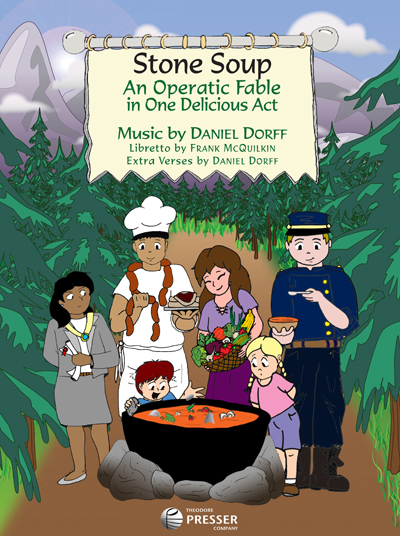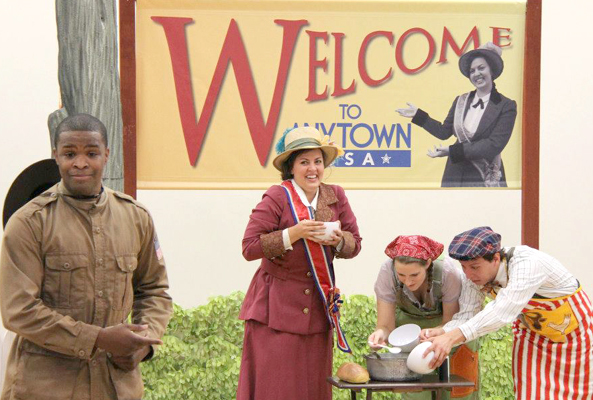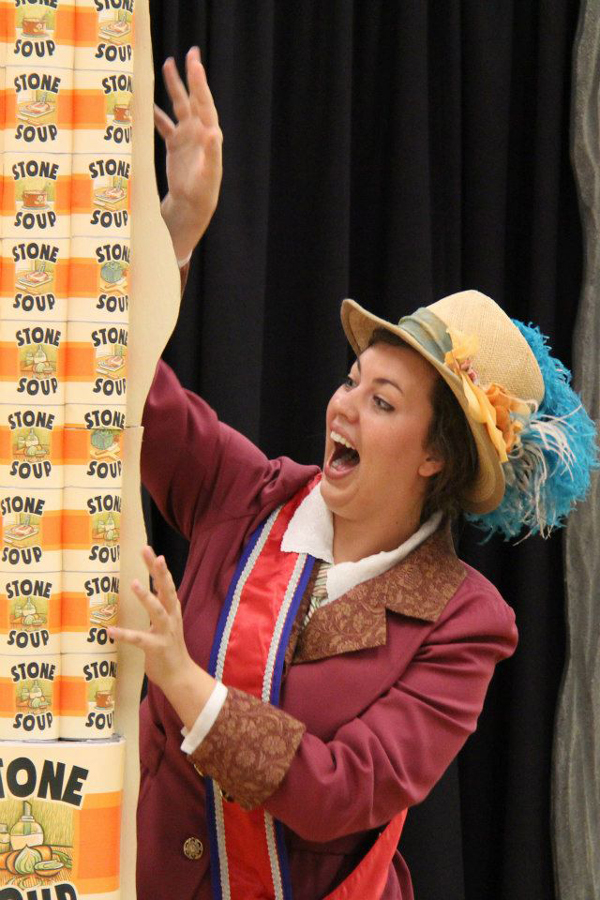|
STONE SOUP was my first
professional commission, composed in the summer of 1983. To conjure up tunes
that were so catchy that they felt inevitable, I walked up and down the streets
of Southwest Philadelphia with Frank McQuilkin's clever libretto, singing along
until each scene came out right.
Commissioned by Young
Audiences of Greater Philadelphia for their in-school opera ensemble, STONE SOUP
received well over 1000 performances over 20 seasons of "continuous run" in Philadelphia-area schools.
A subsequent commission
from Young Audiences took the opera, originally composed only with piano
accompaniment, into a chamber orchestra version which has also received
performances around the country.
Using catchy tunes,
humor, and a story about food, young listeners stay engaged and absorb the very
timeless metaphor that "it takes all kinds of people to make up a happy
town" just as "it takes all kinds of food to make Stone Soup." Through the one-act opera, which may seem like entertainment for young
listeners, this important message is introduced, while the equally important
message that opera is fun is also in the background!
STONE SOUP uses a cast
of 4 principal singers: Vegetable Lady (Soprano), Mayor (Alto), Soldier (Tenor),
Butcher (Bass). In addition there are small speaking roles for several children,
and an optional chorus of townspeople. It was composed for solo piano
accompaniment, and later orchestrated for an ensemble of 1-1-1-1, 1-1-1-0, Harp,
Piano, 2 Percussion, and Strings which may be 1 per part, or doubled.
|

cover art by Alexis Napoliello |
|
SYNOPSIS AND SET NUMBERS:
1.
OVERTURE - Musical introduction and Soldier's entrance
2. SOLDIER'S SCENE- He is lost, lonely and hungry; cartoon-like sound effects
about him yawning and his stomach growling.
3. SOLDIER'S SONG - Soldier (Tenor) sings that he's gotten lost.
4. ALL KINDS OF PEOPLE - Big production number for entire cast (SATB soloists,
optional chorus of villagers), with the refrain "It takes all kinds of people
to make up a happy town." That becomes the underlying moral of the whole
story.
5. JOBS TRIO - Mayor (Alto), Butcher (Bass) and Vegetable lady (Soprano) sing
arias introducing themselves, their personalities, and caricaturing themselves.
[brief dialogue transition]
6. MAGIC SCENE - Soldier wonders what to do, has a sudden idea, then shows
children how to make soup out of stones; followed by a Magic Chant and
dialogue.
[Butcher enters. Soldier explains he's making the most delicious soup in the
world, with only water and stones. Butcher says if people think they can make
soup with only stones, then his business will be ruined!]
7. STONE SOUP SONG - Butcher sings that all soup needs meat; mostly solo for
Butcher, but Soldier has some lines, too.
8. MAGIC INTERLUDE - Brief return to Magic Scene's music, now introducing the
Butcher to the magic soup. Brief dialogue follows.
9. STREET CRY - Vegetable Lady enters and sings a brief solo chanting a street
vendor's cry about her vegetables, then dialogue about the magic soup being made
with no vegetables; she responds that if there's any wonderful soup being made,
it's got to have vegetables!
10. FOOD FIGHT DUET - Butcher and Vegetable Lady have a vehement and comical "argument duet" (with simultaneous competing cadenzas) debating whether meat
or vegetables are more crucial to a good soup.
[brief dialogue transition]
11. GOOD SMELL SONG - Mayor's aria about how happy she feels when she smells
good food; she meets the others making soup, and the aria becomes a quartet.
12. MAGIC WORDS - Brief reprise of No. 6 as the soup is completed; a banner is
unfurled and the Mayor declares "Stone Soup Day."
13. FINALE - Happy ending, based on reprises of the magic chant and "It
takes all kinds of people to make up a happy town," paired with the lines
"it takes all kinds of food to make stone soup" to celebrate the metaphor
and moral. |

Magic Scene from the world premiere
performance
(left to right: Jeremy Slavin, Mertine Johns,
Gregory Cantwell,
Elena Clancy)

Scene from The
Atlanta Opera 2012-13 production
(left to right: Jevares Myrick, Katherine Oates,
Katherine Bowen,
Ivan Segovia)

|



